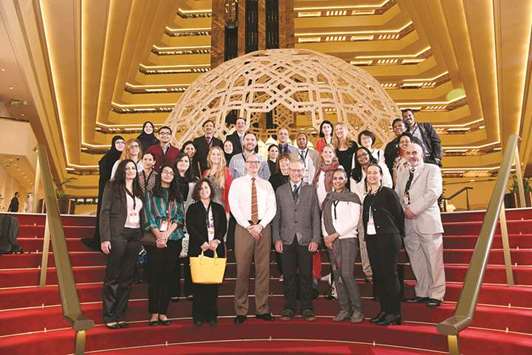The role of the medical humanities in improving understanding of both disease and wellness was explored at a two-day conference organised by Weill Cornell Medicine-Qatar (WCM-Q).
The Medical Humanities in the Middle East Programme brought senior academics in the fields of medicine and the humanities from Europe, the Middle East, Asia and North America together in Doha to discuss the impact on perceptions of health and disease of a broad spectrum of humanities subjects, including literature, history, politics, religion, art and art therapy, and medical ethics, among others.
The conference began with a keynote speech by Dr Mohamed Ghaly of the College of Islamic Studies at Hamad Bin Khalifa University on Islamic perspectives on ethical issues relating to genomics. This was followed by a series of presentations by expert speakers arranged in five sessions addressing the arts and healing, humanities and literature, sociological and historical approaches to understanding healthcare, medical ethics and culture and its impact on the clinic.
Academics and professionals were in attendance from institutions that included WCM-Q, Hamad Medical Corporation, Qatargas, Boston University School of Medicine, King’s College London, the American University of Beirut, University College London and others.
Dr Alan Weber, professor of English at WCM-Q and a member of the organising committee of the event, said: “The medical humanities have emerged as important and useful tools for helping medical practitioners, academics and students reconcile the pressing sociological, economic, philosophical and ethical issues that arise in the practice of medicine. This conference brought together experts from all over the world to discuss these issues, with the ultimate goal of discovering how far and in what ways humanistic approaches to medicine and the teaching of medicine can improve patient outcomes.”
The event featured presentations of abstracts of 24 research projects on topics such as the use of art therapy in medical settings for dealing with grief, the role of storytelling in trauma therapy, the impact of fluorescent lighting on Attention Deficit Hyperactivity Disorder and the challenges of integrating the humanities into medical curricula.
Dr Mohamud Verjee, associate professor of family medicine in clinical medicine/assistant dean for medical student affairs, WCM-Q, gave a presentation and submitted an abstract examining the importance and nature of the listening skills deployed by physicians when conducting consultations with patients. Dr Verjee was also a member of the organising committee along with Jamie Gray, director of the Distributed eLibrary at WCM-Q.
The conference also saw research posters presented by Dr Linda Miller of Imperial College London on ‘Graphic medicine as a reflective tool for self-efficacy and motivation’ and Dr Tsai Pi-hua of Mackay Medical College in Taipei, Taiwan, on ‘Preparing medical students for the writing of history of present illness: Marching from short story reading and the practice of visual art’.

Participants from Europe, the Middle East, Asia and North America convened at the WCM-Q conference.
